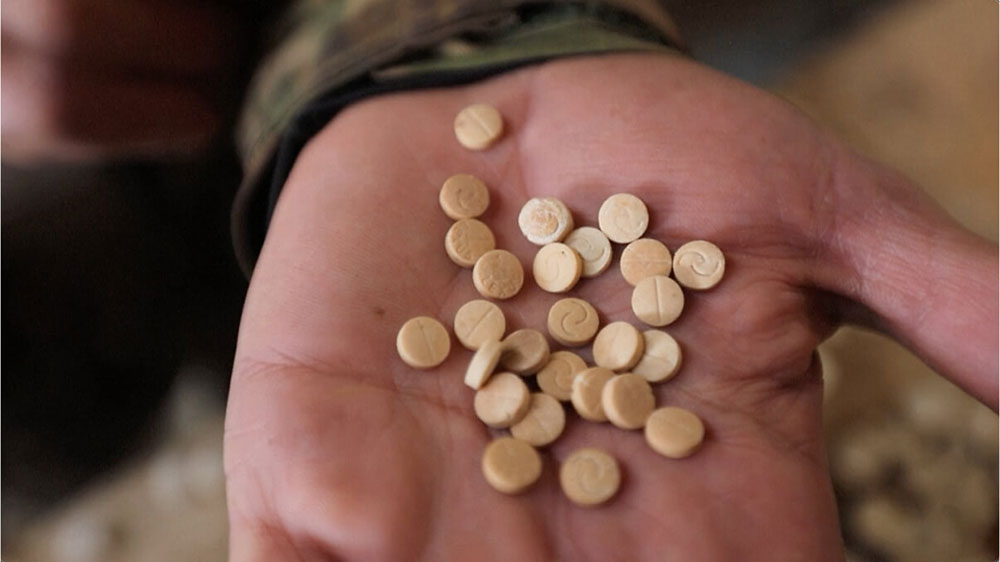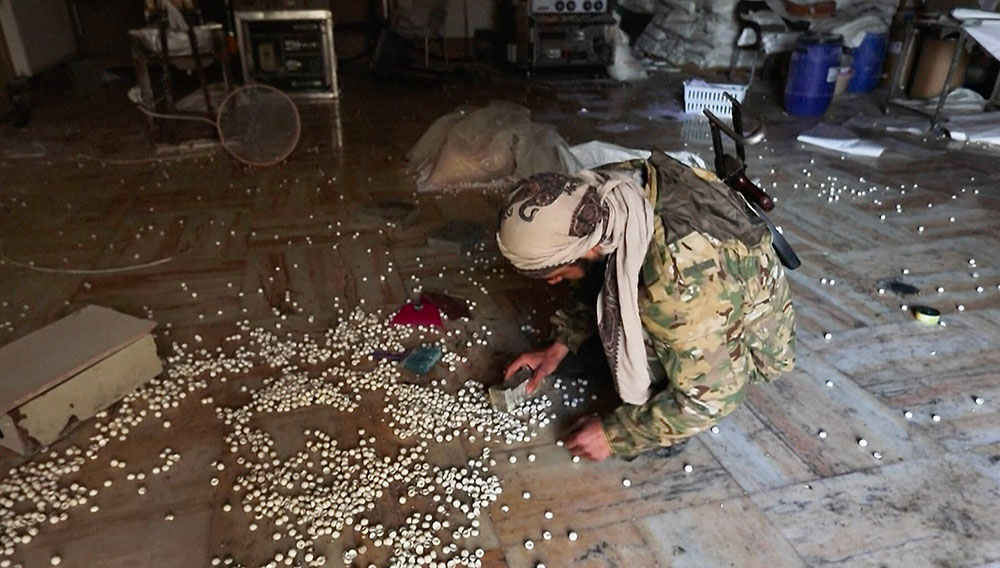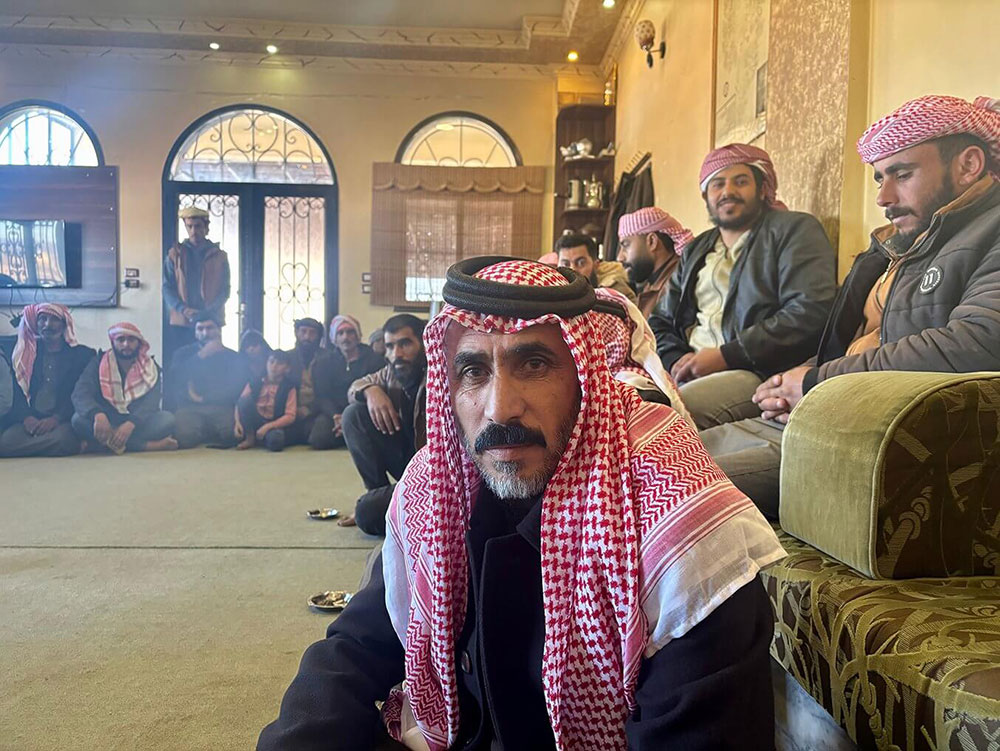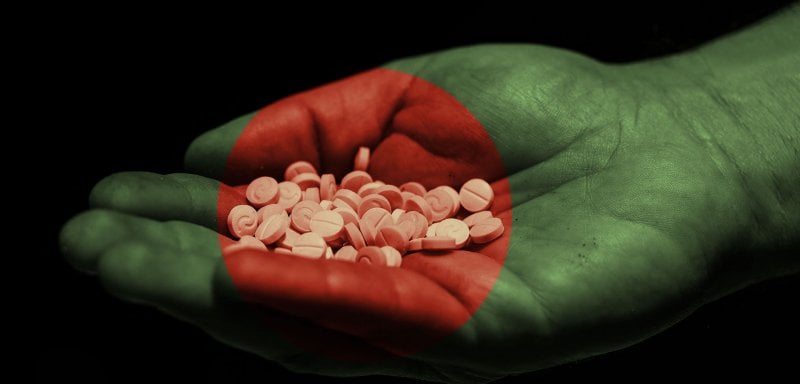On November 10, 2023, as Mahmoud al-Harbi al-Kafri was about to start his car on a road in the Syrian village of Maaraba. A string of bullets targeted his body; his assassins showed him no mercy, as evidenced by the video surveillance footage that Forbidden Stories was able to access.
One of the key findings made from Forbidden Stories’ report that Captagon trafficking continues on the border between Syria and Jordan, despite the fall of Bashar al-Assad's regime, which had been at the forefront of the lucrative business. One of the men suspected of murdering journalist Mahmoud al-Harbi is now free and continues to work with Captagon traffickers.
The fall of the regime has not put an end to Captagon trafficking, a drug that is manufactured in Syria and widely available in the Middle East. For Syrian journalists, investigating this trade remains a forbidden and often deadly pursuit.
A journalist for the local media outlet Daraa 24, al-Harbi had revealed the involvement of a local family in the trafficking of Captagon, a synthetic drug with stimulating effects, in an article published 10 days before his assassination.
In his article, shared without al-Harbi’s name, he claims that “al-Ruwais’s father comes from a Bedouin tribe and is accused of working in the drug trade […] His farm, allegedly used as a warehouse or laboratory for manufacturing Captagon, was evacuated after the Jordanian bombardment of trafficking headquarters in Daraa and Suwayda.”
Located near the border with Jordan, these two towns in the south of Syria have become hubs for the trafficking of Captagon: a strategic gateway to the Gulf states where an amphetamine pill can be bought for up to $20 USD each.
Captagon, an estimated $10 billion trade
Daraa 24, a local media outlet founded in the Syrian city of the same name in 2018—under al-Assad’s merciless regime—presents itself as “an independent media network unaffiliated with any political or military entity.” The website publishes articles and reports that do not name their authors, and journalists are not required to reveal their identities.
The editorial team, about 30 employees strong, has built up a solid reputation over the years by publishing several articles on the illegal trade of Captagon—estimated to rake in more than $10 billion each year, according to Le Monde—sometimes naming specific families and individuals who are directly involved in its manufacturing and distribution.
“Captagon trafficking is three times bigger than the trafficking done by Mexican cartels, so we have to expose it,” Mikad* (a pseudonym for a Syrian journalist and colleague of al-Harbi) told Forbidden Stories. Discreet and cautious, the editor-in-chief of Daraa 24 is a “shadow,” even to his colleagues, whose safety he tries to guarantee at all costs. “I can’t say precisely which article or news item led to [al-Harbi’s] death. What I do know is that he was killed by a militiaman linked to a Captagon baron.”
A CCTV camera identified one of al-Harbi’s murderers: Mohammad al-Arif al-Abbas, sentenced to death on March 2, 2024, before escaping from prison almost a month later under mysterious circumstances.
“I knew I had to stay away from it. I saw everything, but I only published reports about the official seizures put forward by the regime.” — Sultan al-Halabi, Syrian journalist
Behind the billions of Captagon pills exported around the world, al-Assad’s hand is never too far away. Over the years, drugs even became the economic mainstay of the regime suffocated by war and international sanctions.
It’s a subject that local journalists like Sultan al-Halabi, who uses a pseudonym for his investigations, have preferred not to cover. “I knew I had to stay away from it. I saw everything, but I only published reports about the official seizures put forward by the regime,” said the 33-year-old resident of Suwayda, the Druze capital located approximately 100 kilometers from Damascus.
“Captagon was everywhere in town, but we could only talk about it on the surface,” he added.
Although the Suwayda region was spared arbitrary arrests and bombings under the “dictatorial” regime, surveillance of the population and local journalists continued. Al-Halabi was able to see this for himself after Assad fled, and the regime fell in December 2024.
In the archives of the Syrian intelligence services, he recovered a notebook entitled “Information,” in which his name appears alongside those of a hundred other journalists and activists from his province. His life had been dissected by the dreaded Mukhabarat (Syria’s intelligence service), including markers such as “married,” “did not do his compulsory military service,” and “ part of the demonstrators in Suwayda.” Right up to the last hours of the Baath Party’s rule, intelligence agents recorded every detail of his life.
Syrian journalist Mahmoud al-Harbi was killed after reporting about the Captagon trade in the country’s south during Assad’s rule. Despite the regime's collapse more than two months ago, investigating this lucrative trade remains fraught with danger for Syrian journalists.
This constant surveillance, coupled with the reign of terror in Syria, only increased the risks for those who dared to write about Captagon. Ahmed, a journalist for Al Rasd News, and father of two, admits to having censored himself to protect his family. “We limited ourselves to information published by media close to the regime,” he said. “It was too risky to go any further.”
For his colleagues, al-Harbi’s murder drew a “red line”
More than a year after al-Harbi’s murder, the Daraa 24 team discovered a video showing one of his presumed assassins attending a wedding for a son of Mohammad al-Rifai, also known as Abu Ali al-Laham, wanted by the new authorities, according to the Qatari news channel Al Jazeera. Al-Laham, who claims to be a former intelligence commander in al-Assad’s air force, is accused of kidnapping, murder, and trafficking Captagon to Jordan.
For journalists in the region, al-Harbi’s murder drew “a red line that must not be crossed,” said Mikad.
“We knew what Daraa 24 was courageously publishing about the Captagon gangs when we learned of [al-Harbi’s] death. And that sent us a clear message: ‘Don’t touch this subject,’” explained al-Halabi.
Even after the fall of the regime, “Captagon remains a taboo subject” in the region, according to Mikad.
“When we learned of al-Harbi’s death, it sent a clear message: ‘don’t touch this subject.’” — Sultan al-Halabi, Syrian journalist
Since al-Assad fled to Russia, armed men have been roaming Suwayda’s streets, but their identity remains unclear. “A few have fled, but the majority of militiamen are still there. The fall of [al-Assad] hasn’t changed any of that,” al-Halabi told us.
Asked about the possibility of abandoning his pseudonym, his response was clear. “No. I know that many journalists have revealed their identities, but I appreciate the freedom that comes with having my name protected. That said, even working anonymously, you can’t access all the sources on Captagon, because it’s still dangerous.”
Unable to publish some of the sensitive information they had obtained, al-Halabi, Ahmed, and Mikad decided to pass it on to Forbidden Stories in the hope of breaking the omertà surrounding Captagon trafficking: an evil that continues to plague Suwayda and Daraa.
In Suwayda, Captagon barons survive the fall of Assad
After his ousting, Assad’s successors promised an end to this illegal trade. But the reality on the ground is quite different. From local militias associated with the new government to smugglers and alleged accomplices, the end of Captagon seems an illusion.
One of the most important findings reached is that even after the fall of Bashar al-Assad two months ago, Captagon pills are still easy to come by. In the Druze city of Suwayda, the al-Karama militia, which is ready to merge into the new regime’s unified military body, remains ambiguous about trafficking. On the border with Jordan, smuggling is still visible despite the Jordanian army's anti-drug operations in Syria.
“Capty,” also nicknamed “Captain Majid” as a reference to the wide-eyed heroes in the Japanese cartoon anime Captain Tsubasa (Captain Majid in Arabic), is nothing new for this 27-year-old man who did not share his name. Nor are the drug’s side effects.
“Before the regime fell, I had to walk 10 meters to buy Captagon,” he said. “Today, I have to walk 20 or 25.”
In Suwayda, a Druze city south of Damascus near the Jordanian border, he worked in a kolabat, or a roadside stall. These stalls sell hot drinks and petrol, but inside some, “nothing is forbidden.” Captagon dealers freely sell their little beige pills, counterfeits of a psychoactive drug originally designed to combat fatigue and depression. He would take them twice a week to get through his nights at work.
Five minutes and less than $1 for a pill
Syrian journalists still face great difficulties in investigating Captagon trafficking. Three of them entrusted Forbidden Stories with their findings so that their investigations could be continued.
The new authorities from the Islamist rebel group Hayat Tahrir al-Sham (HTS) have promised to put an end to Captagon trafficking, which was a mainstay of the Assad regime’s economy since the start of the civil war in 2011. But in Suwayda, nothing has changed, according to the man at the stall.
“Before the regime fell, I had to walk 10 meters to buy Captagon,” he said. “Today, I have to walk 20 or 25.”
On January 11, Forbidden Stories accompanied the man to buy a Captagon pill. He went to a kolabat unannounced and returned five minutes later with the pill in hand. “You see, nothing has changed,” he said.
The cost of each pill is 10,000 Syrian pounds (around $0.70), which is the average price for a pack of cigarettes.
 A soldier from the Hayat Tahrir al-Sham (HTS) group holds out Captagon pills from a laboratory discovered in Yafour (December 2024). Credit: AFP.
A soldier from the Hayat Tahrir al-Sham (HTS) group holds out Captagon pills from a laboratory discovered in Yafour (December 2024). Credit: AFP.
A soldier from the Hayat Tahrir al-Sham (HTS) group holds out Captagon pills from a laboratory discovered in Yafour (December 2024). Credit: AFP.
In Suwayda, at least 40 kolabats flourish. The anonymous user identified the majority of them on a busy street to the east of the city, leading to the municipal stadium where traffic is particularly intense.
Captagon pills remain easy to obtain, and in the Druze city of Suwayda, the "al-Karama" militia—which has pledged allegiance to the new regime and is preparing to integrate into the regular army—continues to handle the smuggling issue ambiguously.
At the same time, the new Syrian authorities are promoting their fight against Captagon by using social networks to circulate the discovery and destruction of warehouses belonging to the deposed regime.
An agreement signed on January 7 with Jordan promised to put an end to this trafficking, with HTS Foreign Minister Asaad Hassan al-Shibani pledging. “When it comes to Captagon and drug smuggling, we promise it is over and won’t return. We are ready to cooperate on this extensively.”
 A soldier from the Hayat Tahrir al-Sham (HTS) group shows a Captagon manufacturing laboratory discovered in Yafour (December 2024). / Credit: AFP
A soldier from the Hayat Tahrir al-Sham (HTS) group shows a Captagon manufacturing laboratory discovered in Yafour (December 2024). / Credit: AFP
A soldier from the Hayat Tahrir al-Sham (HTS) group shows a Captagon manufacturing laboratory discovered in Yafour (December 2024). / Credit: AFP
Caroline Rose, a specialist in Captagon trafficking at the American think-tank New Lines Institute, acknowledges real efforts to dismantle major production laboratories. But many challenges remain.
“Small, mobile and discreet clandestine laboratories are much harder to detect,” Rose said. “In a border region like Suwayda, which attracts a lot of smugglers, the logistical and geographical challenges are immense. Do these authorities have sophisticated surveillance systems or equipment to effectively secure the borders? For the time being, it seems they don’t.”
Since the toppling of the regime, the province of Suwayda has remained under the control of local militias. The most powerful of them is al-Karama, the “dignity” militia, which has pledged allegiance to HTS.
According to several sources interviewed by Forbidden Stories, while it is officially opposed to Captagon trafficking, its role in the trade is ambiguous.
One man Forbidden Stories spoke to formed an anti-Captagon militia and was imprisoned in 2020 by the Assad regime. “They don’t attack the traffickers: they eliminate the competition,” he said of al-Karama. “In prison, I saw them arrest small-time dealers and transfer them to regime-controlled prisons. Assad and al-Karama are as bad as each other.”
“The fall of Assad only temporarily curbed trafficking, without eliminating the drug barons. Nothing has changed here.”
In 2022, al-Karama claimed responsibility for the capture of Raji Falhout, the leader of an armed group accused of trafficking and linked to Syrian military intelligence. After the siege of his home, Falhout mysteriously disappeared and Captagon presses were discovered in his headquarters.
Claims that al-Karama was “cleansing the town” circulated in the media, but some local journalists pushed back.
“Al-Karama caught him, and then he disappeared.,” one of them said, having followed the case.
Al-Karama: An untouchable authority
A young member of al-Karama also has similar suspicions. When he discovered a clandestine Captagon workshop in 2023, “Abou Hassan, the leader of al-Karama, forbade us to intervene.”
Despite his doubts, he remains in the militia to protect himself. “Al-Karama was the most powerful group under Assad, and it still is.” According to this member, the fall of Assad only “temporarily curbed trafficking, without eliminating the drug barons. Nothing has changed here.”
As a result, the Mazhar family in Suwayda has maintained power: followed by over 7,000 people on its Facebook page and once closely linked to the overthrown Syrian regime. Several of its members joined an association founded by former First Lady Asma al-Assad to support the relatives of slain soldiers.
According to Syria Direct, the Mazhar family seems to have played a key role in Captagon trafficking, with the help of its connections to the regime.
In 2013, a rumor circulated throughout Suwayda, suggesting a treasure discovery behind the Mazhars’ sudden enrichment. Today, the family owns several villas in the city center.
“They run a Captagon factory 7 kilometers from their neighborhood and are actively involved in trafficking,” said a local journalist, who has not published this information out of fear for his family.
“If you have a problem, go and see them. They can solve anything. During the war, there were kidnappings linked to the Captagon gangs, and they were the ones who negotiated releases,” he added. Several other sources were able to confirm this.
Forbidden Stories visited the family’s district in the old town of Suwayda, a place frozen in time. Modern buildings give way to traditional stone houses, creating the impression of a village isolated from the rest of the city. The Mazhars, considered supporters of Assad, live under protection. At the entrance to their stronghold, a tractor blocks the road and low walls obstruct other access points, while spotters watch every move. Despite the allegations against them, none of the family members have been arrested.
Captagon trafficking continues on the border between Syria and Jordan, despite the fall of Bashar al-Assad's regime which had been at the forefront of this lucrative business. One of the men suspected of murdering journalist Mahmoud al-Harbi is now free and continues to associate with Captagon traffickers.
Jordanian raids against Captagon trafficking
The role of Assad’s regime in the introduction and expansion of Captagon in Syria is central. Khaled, a former soldier in Regiment 405 whose name has been changed, told us, “In 2013, a comrade handed me a pill and said, ‘You look tired, take this.’ It was so common that one of my colleagues asked for some in a pharmacy, thinking it was a conventional medication.”
The soldiers figured these pills came from enemy seizures, unaware of the fact that the regime was already producing Captagon on a large scale to finance its war against rebel groups, despite international sanctions.
Its operations relied on the 4th Armored Division, commanded by Assad’s brother Maher al-Assad, to control smuggling routes and production infrastructures with the support of affiliated militias.
Suwayda became a hotbed for Captagon trafficking, which spread to the province’s margins, notably along the Jordanian border.
Suwayda, in southern Syria, is a hub for the trafficking of Captagon, the synthetic drug that has flooded the Middle East for a decade. After his ousting, Assad’s successors promised an end to this illegal trade. But the reality on the ground is quite different. From local militias associated with the new government to smugglers and alleged accomplices, the end of Captagon seems an illusion.
Since Assad’s ousting, attempts to smuggle drugs into Jordan still continue. In the Bedouin villages that make up the region, bombardments—likely Jordanian—take place regularly.
On January 13, 2025, two strikes targeted the desert village of Shaab, supposedly a key staging post in the Captagon trade. The day after the bombing, local Bedouin sheikh Mohammed Awad al-Ramthan, interviewed on-site by Forbidden Stories, defended his community. “We can’t monitor almost 200 kilometers of [the] border,” he said. “Yes, some young people are involved in trafficking, but we don’t know them, and they deal in old pills.”
 Sheikh Mohammed Awad al-Ramthan, head of the Bedouin community in the village of Shaab. (Credit: Paloma de Dinechin)
Sheikh Mohammed Awad al-Ramthan, head of the Bedouin community in the village of Shaab. (Credit: Paloma de Dinechin)
Sheikh Mohammed Awad al-Ramthan, head of the Bedouin community in the village of Shaab. (Credit: Paloma de Dinechin)
In these remote areas, masked faces and cars with tinted windows are a testament to a thriving underground trade, despite air raids and arrests. Before any photo was taken, the local journalist accompanying Forbidden Stories in Syria always warned his interlocutors when they appeared in frame: “Cover your face if you work in the Captagon business.”
On January 20, the “Gathering of Southern Clans” issued a communique announcing “the establishment of patrols to prevent the use of their towns’ lands for trafficking or smuggling operations.”
Among the figures targeted by the Jordanian authorities in their fight against Captagon, Faris S. stands out. Originally from Arman, near Shaab, he is a livestock trader with several smuggling convictions from the 1990s.
Faris S. agreed to talk to Forbidden Stories for the first time, in a private room at Suwayda’s most upscale cafe. Sporting a black jacket and a red and white keffiyeh held together by a black agal, he spoke loudly. Several times, Faris S. put his hand to his heart, as if to testify to his innocence. He denied any involvement in Captagon trafficking, asserting that the Suwayda province is unaffected by the trade and that his farms contain only agricultural produce and livestock. Faris S. moves about freely in Suwayda and claims to be “friends” with the Mazhar family and the leader of al-Karama, who he swears are innocent of trafficking.
“We don’t have the power to stop [the Mazhars],” an influential member of al-Karama told us. “Their power guarantees social peace. We’re one big Druze family.”
Since the fall of Assad’s regime, no arrests have been made and no Captagon production sites have been discovered in relation to this “big Druze family” in Suwayda. In January 2024, al-Karama destroyed a single kolabat, and no others have been targeted since.
Back in Damascus, the shadow of Captagon remains omnipresent, even in everyday life. At a cafe, a waiter was heard calling out, “Are you tired? Take a capty. Would you like a few? I’ll bring you some right away.”
*First names of the journalists interviewed have been changed for security reasons, and some pseudonyms have been used for the same purpose.
Raseef22 is a not for profit entity. Our focus is on quality journalism. Every contribution to the NasRaseef membership goes directly towards journalism production. We stand independent, not accepting corporate sponsorships, sponsored content or political funding.
Support our mission to keep Raseef22 available to all readers by clicking here!
Interested in writing with us? Check our pitch process here!



